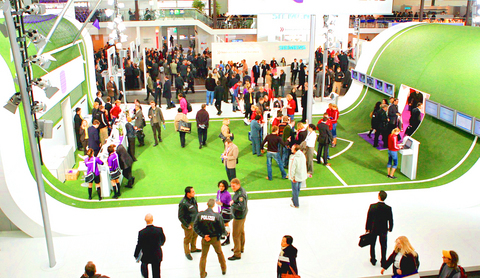Asustek Computer Inc (
"We are still working on the project and more details are yet to be settled," Asustek's global brand marketing director Sunny Han (
However, local users should be able to see the products in June, about the same time as US consumers, he said.

PHOTO: EPA
CeBIT, the world's largest technology trade fair, opened on Thursday in Hanover, Germany. At the fair, Microsoft and its hardware partners took the wraps off its mysterious "Project Origami" to unveil a new breed of PCs which are super-portable, full-fledged computers that weigh about 1.1kg, roughly the size of a paperback book, and feature a 17.8cm touch screen.
"These ultra-mobile PCs combine the functionalities of personal digital assistants and notebooks, offering users real-time information wherever they go," Han said.
The prices of Asustek's machines -- codenamed Asus R2H -- haven't yet been announced.
They reportedly come in two versions, with the more expensive device containing an embedded global positioning system that can be used with car navigation software running on Windows XP.
The R2H will also use a special fingerprint sensor that analyzes not only the surface of the skin but also the flesh below.
The built-in Webcam allows the computer to work as a video phone.
Joining forces with Microsoft and Intel Corp for the "personal digital lifestyle" push, Asustek said the R2H is the company's commitment to new innovations.
"Compared to Dell or Hewlett-Packard, which outsource most of their computer production, we still have a strong advantage in research and development and can come out with brand new computer products," he said.
In addition to Asustek, South Korea's Samsung Electronics Co and Chinese manufacturer Founder Group (方正集團) are expected to unveil their ultra-mobile machines next month and in the summer, respectively.
"These machines are geared toward niche markets for power users and fashionable mobile users, who are looking for second computers. They are a new innovation and we don't expect the initial volumes to be as high as those of portable computers," Han said.
At CeBIT, vendors showing off their latest wares also include BenQ Corp (
BenQ, for instance, unveiled six new mobile phones, including one that slides open to reveal the dialing pad.
"Our average selling price per handset will for sure rise this year on a better product mix," the Bloomberg financial news agency quoted BenQ Mobile CEO Clemens Joos as saying yesterday. "We don't want to position ourselves in the low-end market where there is no means of differentiation other than through price."

To many, Tatu City on the outskirts of Nairobi looks like a success. The first city entirely built by a private company to be operational in east Africa, with about 25,000 people living and working there, it accounts for about two-thirds of all foreign investment in Kenya. Its low-tax status has attracted more than 100 businesses including Heineken, coffee brand Dormans, and the biggest call-center and cold-chain transport firms in the region. However, to some local politicians, Tatu City has looked more like a target for extortion. A parade of governors have demanded land worth millions of dollars in exchange

An Indonesian animated movie is smashing regional box office records and could be set for wider success as it prepares to open beyond the Southeast Asian archipelago’s silver screens. Jumbo — a film based on the adventures of main character, Don, a large orphaned Indonesian boy facing bullying at school — last month became the highest-grossing Southeast Asian animated film, raking in more than US$8 million. Released at the end of March to coincide with the Eid holidays after the Islamic fasting month of Ramadan, the movie has hit 8 million ticket sales, the third-highest in Indonesian cinema history, Film

Taiwan Semiconductor Manufacturing Co’s (TSMC, 台積電) revenue jumped 48 percent last month, underscoring how electronics firms scrambled to acquire essential components before global tariffs took effect. The main chipmaker for Apple Inc and Nvidia Corp reported monthly sales of NT$349.6 billion (US$11.6 billion). That compares with the average analysts’ estimate for a 38 percent rise in second-quarter revenue. US President Donald Trump’s trade war is prompting economists to retool GDP forecasts worldwide, casting doubt over the outlook for everything from iPhone demand to computing and datacenter construction. However, TSMC — a barometer for global tech spending given its central role in the

Alchip Technologies Ltd (世芯), an application-specific integrated circuit (ASIC) designer specializing in server chips, expects revenue to decline this year due to sagging demand for 5-nanometer artificial intelligence (AI) chips from a North America-based major customer, a company executive said yesterday. That would be the first contraction in revenue for Alchip as it has been enjoying strong revenue growth over the past few years, benefiting from cloud-service providers’ moves to reduce dependence on Nvidia Corp’s expensive AI chips by building their own AI accelerator by outsourcing chip design. The 5-nanometer chip was supposed to be a new growth engine as the lifecycle